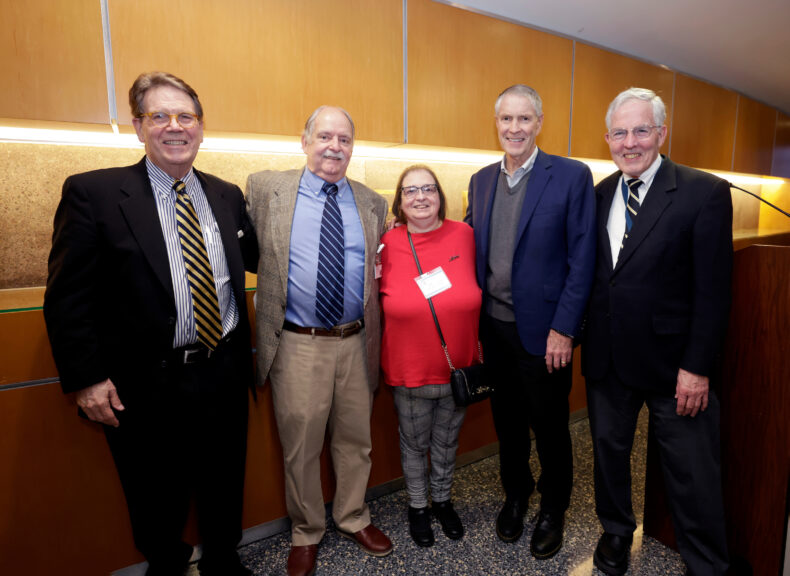
by Matt Batcheldor
Pam Everett-Smith celebrated a milestone this past November — 30 years since she received a lung transplant at Vanderbilt University Medical Center. She is the longest-surviving single-lung transplant patient known in the United States.
Vanderbilt transplanted its first lung in 1990. Everett-Smith was only the fourth patient at Vanderbilt to receive a lung transplant.
“I’m 56 now and I didn’t think I’d see 30, let alone 56,” she said. “I just thank God for every day that he gives me.”
In general, lung transplant patients have only about a 50% chance of living six years, said Everett-Smith’s pulmonologist, Ivan Robbins, MD, professor of Medicine. The odds of surviving 10 years are even leaner — only about 30%.
Robbins said he couldn’t fully explain why Everett-Smith’s transplant was so successful. Though doctors try carefully to match donor lungs using blood type and human leukocyte antigens (HLAs), some of what makes a good match remains a medical mystery. Survival is most commonly impacted by chronic organ rejection.
“There’s an element of luck,” Robbins said. “I just don’t know why. But she certainly beat the odds.”
More than three decades ago, Everett-Smith was diagnosed with pulmonary arterial hypertension (PAH), a rare lung disorder caused by an elevated blood pressure within the pulmonary arteries. She had a hard time breathing just doing everyday activities. It runs in her family, she said; her dad and sister both had this disease.
When she was diagnosed with PAH, there were no medical treatments available, and doctors recommended that she consider a transplant, but it was a more familiar voice that persuaded her. “A friend of mine asked me what choice did I have if I wanted to live?” she said. “That was the only choice I had.”
Everett-Smith was first listed for a double-lung and heart transplant. After waiting nearly a year on the waiting list, doctors moved her to the single-lung transplant list, in the hope she would get an organ faster.
Within three months, she got the call from James Loyd, MD, that her organ was available. Loyd helped start the lung transplant program at Vanderbilt and is now retired.
“Dr. Loyd called me the day after Thanksgiving,” Smith said. “He said they thought they had the lung and for me to come over there, that I’d have enough time to drive but to hurry.”
Everett-Smith lives with her husband, Paul, in Athens, Tennessee, which is about three and a half hours away from Vanderbilt. “I think we made it in about two hours,” she said.
On Nov. 24, 1990, Everett-Smith received a single-lung transplant. The current standard of care, double lung transplant, would not happen at Vanderbilt until 1994.
“No one would do a single-lung transplant right now for a patient like her who has pulmonary hypertension,” Robbins said. “They would all get a double lung or a heart-lung, usually a double lung. It’s interesting that she’s done so well with a single lung.”
Her surgeons were Bill Frist, MD, founding director of the Vanderbilt Transplant Center and later U.S. Senator, and Walter Merrill, MD, professor of Cardiac Surgery and chief of staff at Vanderbilt University Adult Hospital. She has been in the care of Robbins for most of the last two decades and now sees him once or twice a year.
“I just really deeply appreciate everything, taking care of me and all of the patients, having that compassion for what they do,” she said. “The compassion toward their patients is a big thing I think.”
Robbins said Everett-Smith is in relatively good health. Her lung function has deteriorated in the last five years, but her kidney function, which often suffers in transplant patients due to toxicity of the medications needed to suppress the immune system, has remained normal.
“It’s absolutely remarkable,” he said. “Mrs. Everett-Smith has chronic rejection, but hers has been stable for 15, 20 years now.”
Everett-Smith said she constantly thinks about the person who gave her a second chance at life. She doesn’t know the person’s identity and never met the donor’s family.
“I’ll never forget my donor,” she said. “You think of that all the time.”
She also thinks about how much life she’s been able to live these last three decades.
Four years after she got her transplant, she was married — and celebrated her 26th anniversary this past Christmas Eve.
“It’s hard to put it into words. It’s just so amazing and I feel so blessed,” she said. “Before I had my transplant, I didn’t know that I was going to make it. I just kind of kept a positive attitude about it. I didn’t think that I would see my 30th birthday or see my first niece born. Now I have six nieces and nephews and they’ve got kids.
“It’s just amazing how God has worked in my life and blessed me and blessed the doctors to give them the knowledge and skills that they have to take care of their patients.”











